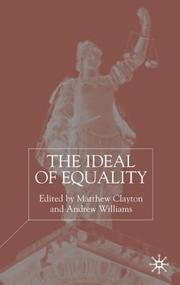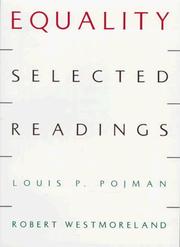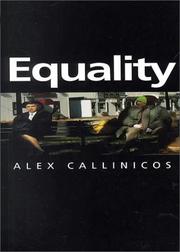| Listing 1 - 10 of 1458 | << page >> |
Sort by
|
Book
ISBN: 2715425767 9782715425767 Year: 2024 Publisher: Paris Presses universitaires de France
Abstract | Keywords | Export | Availability | Bookmark
 Loading...
Loading...Choose an application
- Reference Manager
- EndNote
- RefWorks (Direct export to RefWorks)
Alors qu'elles avaient diminué au XXe siècle, les inégalités économiques se creusent de nouveau, depuis plusieurs décennies, dans la plupart des pays occidentaux. Mais la seule dimension économique ne suffit pas à rendre compte des inégalités, qui doivent aussi être saisies dans leur ensemble, quelle que soit la forme qu'elles prennent. Afin d'appréhender leur pluralité, Nicolas Duvoux dresse un panorama des différentes définitions qu'on donne des inégalités sociales, des outils qui permettent de les mesurer ainsi que des interprétations de la façon dont elles se construisent et s'enracinent. Comprendre les inégalités sociales, c'est dès lors décrypter comment chaque société les conçoit, les critique et tente (ou non) de les combattre.
Equality --- Egalitarianism --- Inequality --- Social equality --- Social stratification

ISBN: 9780333971192 9780312230173 0333971191 Year: 2002 Publisher: Basingstoke Palgrave Macmillan
Abstract | Keywords | Export | Availability | Bookmark
 Loading...
Loading...Choose an application
- Reference Manager
- EndNote
- RefWorks (Direct export to RefWorks)
Political philosophy. Social philosophy --- Equality --- Egalitarianism --- Inequality --- Social equality --- Social inequality --- Political science --- Sociology --- Democracy --- Liberty

ISBN: 2213605645 9782213605647 Year: 2000 Publisher: S.l. Fayard
Abstract | Keywords | Export | Availability | Bookmark
 Loading...
Loading...Choose an application
- Reference Manager
- EndNote
- RefWorks (Direct export to RefWorks)
Equality --- Egalitarianism --- Inequality --- Social equality --- Social inequality --- Political science --- Sociology --- Democracy --- Liberty

ISBN: 0195102509 Year: 1997 Publisher: New York (N.Y.): Oxford university press
Abstract | Keywords | Export | Availability | Bookmark
 Loading...
Loading...Choose an application
- Reference Manager
- EndNote
- RefWorks (Direct export to RefWorks)
Equality. --- Equality --- Egalitarianism --- Inequality --- Social equality --- Social inequality --- Political science --- Sociology --- Democracy --- Liberty

ISBN: 0745623255 9780745623252 Year: 2000 Publisher: Cambridge Polity press
Abstract | Keywords | Export | Availability | Bookmark
 Loading...
Loading...Choose an application
- Reference Manager
- EndNote
- RefWorks (Direct export to RefWorks)
Equality --- Egalitarianism --- Inequality --- Social equality --- Social inequality --- Political science --- Sociology --- Democracy --- Liberty --- Equality.
Book
ISBN: 9888390678 9888390627 9888390376 9789888390373 Year: 2017 Publisher: Hong Kong, [China] : HKU Press,
Abstract | Keywords | Export | Availability | Bookmark
 Loading...
Loading...Choose an application
- Reference Manager
- EndNote
- RefWorks (Direct export to RefWorks)
When discussing inequality and poverty in Hong Kong, scholars and politicians often focus on the failures of government policy and push for an increase in social welfare. Richard Wong argues in Fixing Inequality in Hong Kong that universal retirement support, minimum wage, and standard hours of work are of limited effect in alleviating inequality. By comparing Hong Kong with Singapore, he points out that Hong Kong needs a new and long-term strategy on human resource policy. He recommends more investment in education, starting with early education and immigration policy reforms to attract highly educated and skilled people to join the workforce. In analyzing what causes inequality, this book ties disparate issues together into a coherent framework, such as Hong Kong's aging population, lack of investment in human capital, and family breakdowns. Rising divorce rates among low-income households have created a shortage of housing, driving rents and property prices upwards, and enlarging the wealth gap between those who own housing and those who do not, thus causing intergenerational upward mobility. This is the third of Richard Wong's collections of articles on society and economy in Hong Kong. Diversity and Occasional Anarchy and Hong Kong Land for Hong Kong People, published by Hong Kong University Press in 2013 and 2015 respectively, discuss growing contradictions in Hong Kong's economy and current housing problems as well as their solutions.
Equality. --- Equality --- Egalitarianism --- Inequality --- Social equality --- Social inequality --- Political science --- Sociology --- Democracy --- Liberty
Book
ISBN: 0199549036 1281852295 9786611852290 0191544744 0191613916 Year: 2008 Publisher: Oxford ; New York : Oxford University Press,
Abstract | Keywords | Export | Availability | Bookmark
 Loading...
Loading...Choose an application
- Reference Manager
- EndNote
- RefWorks (Direct export to RefWorks)
What is the ethical basis of democracy? And what reasons do we have to go along with democratic decisions even when we disagree with them? And when do we have reason to say that we may justly ignore democratic decisions? These questions must be answered if we are to have answers to some of the most important questions facing our global community, which include whether there is a human right to democracy and whether we must attempt to spread democracy throughout the globe. This book provides a philosophical account of the moral foundations of democracy and of liberalism. It shows how democracy
Equality --- Democracy --- Liberty --- Philosophy. --- Egalitarianism --- Inequality --- Social equality --- Social inequality --- Political science --- Sociology
Book
ISBN: 0191865834 0192561650 0192561669 Year: 2018 Publisher: Oxford : Oxford University Press,
Abstract | Keywords | Export | Availability | Bookmark
 Loading...
Loading...Choose an application
- Reference Manager
- EndNote
- RefWorks (Direct export to RefWorks)
An all-encompassing examination of the origins, increase, and persistence of inequality in new democracies. It challenges the conventional thinking found in much of the democratisation-inequality literature, and offers a new theory. It speaks simultaneously to literature of democratisation, party systems, social policy, and inequality to explain why democracies are not able to fulfill their promise to the disadvantaged and why they cannot achieve income equality. It investigates social policy programmes such as pensions, unemployment benefits, and other social transfers in Poland and the Czech Republic in post-communist Europe, and Turkey and Spain in Southern Europe.
Equality --- Europe --- Social policy. --- Egalitarianism --- Inequality --- Social equality --- Social inequality --- Political science --- Sociology --- Democracy --- Liberty
Multi
ISBN: 9051663749 Year: 1994 Publisher: Delft Eburon
Abstract | Keywords | Export | Availability | Bookmark
 Loading...
Loading...Choose an application
- Reference Manager
- EndNote
- RefWorks (Direct export to RefWorks)
Equality. --- Equality --- Egalitarianism --- Inequality --- Social equality --- Social inequality --- Political science --- Sociology --- Democracy --- Liberty
Book
ISBN: 9264203427 9264130691 Year: 2018 Publisher: Paris : OECD Publishing,
Abstract | Keywords | Export | Availability | Bookmark
 Loading...
Loading...Choose an application
- Reference Manager
- EndNote
- RefWorks (Direct export to RefWorks)
Equality. --- Egalitarianism --- Inequality --- Social equality --- Social inequality --- Political science --- Sociology --- Democracy --- Liberty
| Listing 1 - 10 of 1458 | << page >> |
Sort by
|

 Search
Search Feedback
Feedback About UniCat
About UniCat  Help
Help News
News